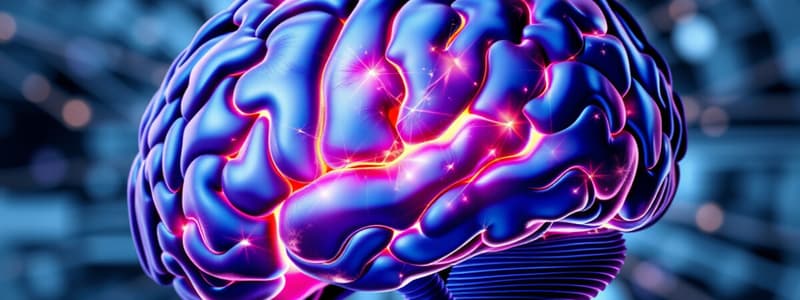Podcast
Questions and Answers
What type of questions should be used during the orientation to place procedure?
What type of questions should be used during the orientation to place procedure?
- Only open questions
- Only situational questions
- A mix of open and closed questions (correct)
- Only closed questions
What is the total point value assigned to the 'Orientation to Place' procedure?
What is the total point value assigned to the 'Orientation to Place' procedure?
- 5 points (correct)
- 3 points
- 2 points
- 8 points
How many words need to be registered during the 'Registration of Three Words' procedure?
How many words need to be registered during the 'Registration of Three Words' procedure?
- Five words
- Four words
- Two words
- Three words (correct)
Which of the following should be the characteristics of the objects selected for the 'Registration of Three Words'?
Which of the following should be the characteristics of the objects selected for the 'Registration of Three Words'?
What aspect of the patient’s condition is to be noted during the orientation procedure?
What aspect of the patient’s condition is to be noted during the orientation procedure?
What is assessed during the attention and calculation portion of the assessment?
What is assessed during the attention and calculation portion of the assessment?
During what aspect of the assessment must a participant remember three objects?
During what aspect of the assessment must a participant remember three objects?
What is the suggested behavior of the interviewer while conducting the orientation to place?
What is the suggested behavior of the interviewer while conducting the orientation to place?
What is the highest possible score on the Mini-Mental Status Examination (MMSE)?
What is the highest possible score on the Mini-Mental Status Examination (MMSE)?
A score of less than what value on the MMSE indicates the presence of cognitive impairment?
A score of less than what value on the MMSE indicates the presence of cognitive impairment?
Which score range denotes mild cognitive impairment on the MMSE?
Which score range denotes mild cognitive impairment on the MMSE?
What is a noted critique of the MMSE based on the content provided?
What is a noted critique of the MMSE based on the content provided?
What is the score range for severe cognitive impairment according to established levels?
What is the score range for severe cognitive impairment according to established levels?
In the Montreal Cognitive Assessment - Philippines (MOCA-P), what kind of test is the clock drawing exercise considered?
In the Montreal Cognitive Assessment - Philippines (MOCA-P), what kind of test is the clock drawing exercise considered?
Which of the following animals is NOT mentioned as an example to be named during the assessment?
Which of the following animals is NOT mentioned as an example to be named during the assessment?
What is the process that follows after introducing a word list in the context of memory assessment?
What is the process that follows after introducing a word list in the context of memory assessment?
What is the approximate capacity of short-term memory?
What is the approximate capacity of short-term memory?
What happens to information in short-term memory if it is not rehearsed?
What happens to information in short-term memory if it is not rehearsed?
Which component is responsible for overseeing the flow of information between memories?
Which component is responsible for overseeing the flow of information between memories?
What technique can help improve short-term memory retention?
What technique can help improve short-term memory retention?
What is the duration of information storage in long-term memory?
What is the duration of information storage in long-term memory?
What is the purpose of the phonological loop in working memory?
What is the purpose of the phonological loop in working memory?
Which statement about long-term memory is accurate?
Which statement about long-term memory is accurate?
Which of the following is NOT a component of working memory?
Which of the following is NOT a component of working memory?
What aspect does the Functional Behavior Assessment (FBA) primarily focus on compared to the Mini-Mental State Examination (MMSE)?
What aspect does the Functional Behavior Assessment (FBA) primarily focus on compared to the Mini-Mental State Examination (MMSE)?
What cognitive ability does the Lotca primarily assess?
What cognitive ability does the Lotca primarily assess?
In the context of the Lotca, what is required from a client during the verbal fluency task?
In the context of the Lotca, what is required from a client during the verbal fluency task?
What does a high premorbid IQ indicate about a client?
What does a high premorbid IQ indicate about a client?
What is the purpose of the serial 7’s task?
What is the purpose of the serial 7’s task?
What is the significance of the concept of abstraction in cognitive assessments?
What is the significance of the concept of abstraction in cognitive assessments?
Which group of individuals is more likely to be assessed using the LOTCA?
Which group of individuals is more likely to be assessed using the LOTCA?
Who were the proponents behind the development of the LOTCA?
Who were the proponents behind the development of the LOTCA?
What does the LOTCA-G measure?
What does the LOTCA-G measure?
How is the score calculated in the memory subtest of LOTCA-G?
How is the score calculated in the memory subtest of LOTCA-G?
What is the maximum number of symbols that can be detected in the visual selective attention test?
What is the maximum number of symbols that can be detected in the visual selective attention test?
Which activity is NOT mentioned as part of the LOTCA-G procedures?
Which activity is NOT mentioned as part of the LOTCA-G procedures?
In the context of the LOTCA-G, what does an auditory elevator with reversal involve?
In the context of the LOTCA-G, what does an auditory elevator with reversal involve?
Which of the following is true about the DLOTCA?
Which of the following is true about the DLOTCA?
What is the purpose of the 'elevator counting with distraction' activity?
What is the purpose of the 'elevator counting with distraction' activity?
What is meant by 'non-standardized tools' in the context of LOTCA-G?
What is meant by 'non-standardized tools' in the context of LOTCA-G?
Flashcards are hidden until you start studying
Study Notes
Working Memory Components
- Short-term Memory (STM): Holds information for seconds to minutes with a capacity of 7 ± 2 items; chunking aids memorization.
- If not rehearsed, information is lost from STM in about 20 seconds.
- Long-term Memory (LTM): Stores information permanently with an unknown or infinite capacity.
Key Components of Working Memory
- Central Executive: Oversees information flow, manages STM and LTM interactions, and integrates new information.
- Phonological Loop: Involves “inner speech” or self-talk, aiding in task management and memory.
Mini-Mental Status Examination
- Conducted via informal inquiry assessing orientation to place and registration of words.
- Registration Tasks: Naming three objects (e.g., apple, table, penny) that must be two syllables or less to facilitate memory recall.
- Scoring for MMSE ranges from 0 to 30; below 24 indicates cognitive impairment.
Levels of Impairment in MMSE
- None: Score of 24-30
- Mild: Score of 18-24
- Severe: Score of 0-17
- Criticisms include low reliability and sensitivity for detecting mild cognitive impairment.
Delayed Recall and Language Tasks
- Delayed recall emphasizes attention and executive function; requires participants to remember and recite words after a set interval.
- Sentence repetition tests verbal memory and cognitive processing.
- Verbal fluency tasks involve naming words that start with a specific letter, assessing word retrieval ability.
LOTCA Cognitive Assessment
- Developed by Itzkovich, Averbuch, Elazar, and Katz; assesses cognitive abilities in adults with neurological and mental health issues.
- LOTCA-G has a memory subtest, measuring selective attention through tasks like searching symbols on a colored map.
- Scoring for attention tasks is based on the number of symbols found within a time limit.
Activities and Tests for Attention and Memory
- Uses non-standardized tools to evaluate attention and memory, offering flexibility in assessment.
- Includes engaging tasks like elevator counting and visual/auditory symbol searches, adapting to test different cognitive functions.
Studying That Suits You
Use AI to generate personalized quizzes and flashcards to suit your learning preferences.




